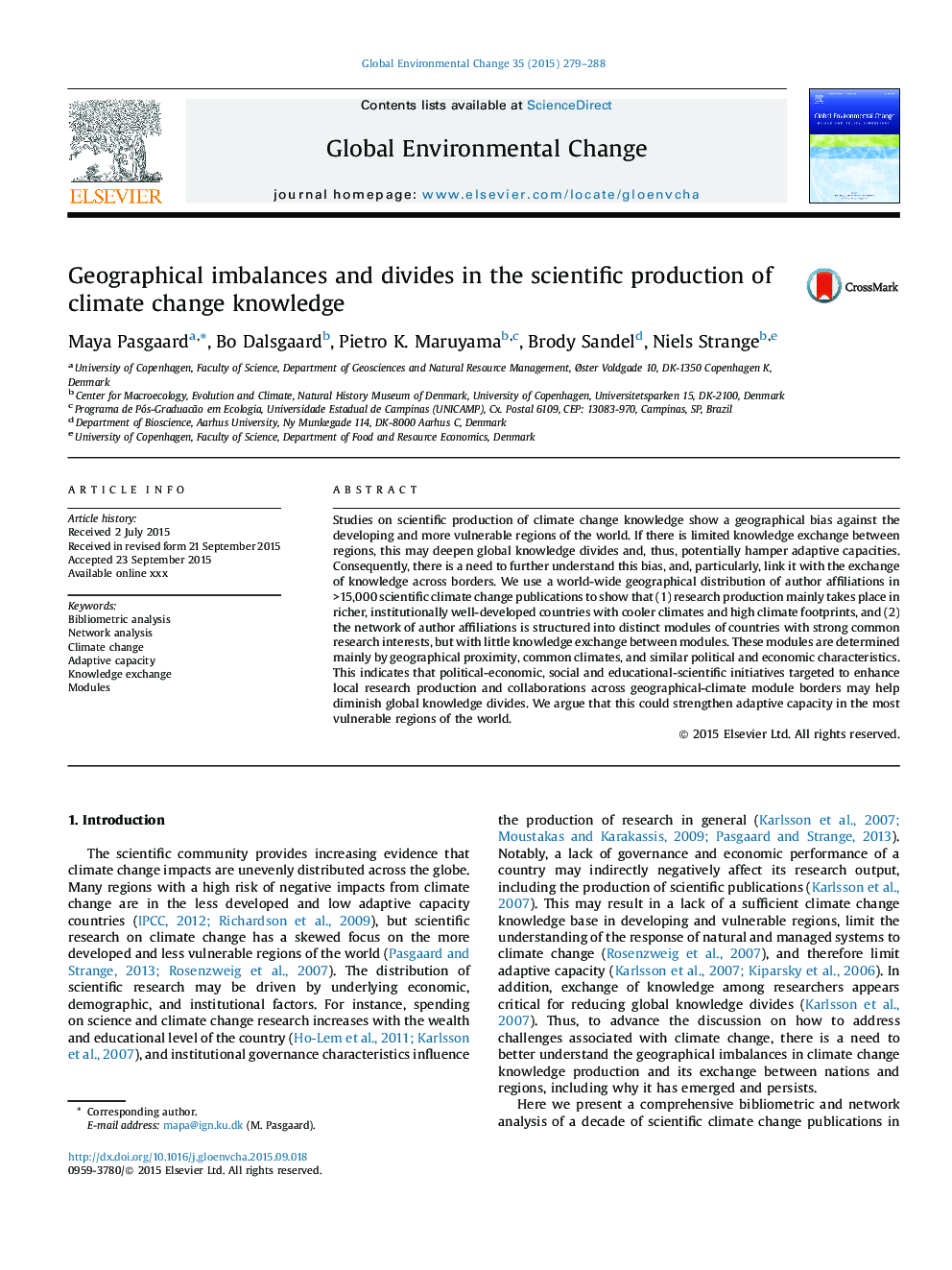| کد مقاله | کد نشریه | سال انتشار | مقاله انگلیسی | نسخه تمام متن |
|---|---|---|---|---|
| 7469697 | 1485123 | 2015 | 10 صفحه PDF | دانلود رایگان |
عنوان انگلیسی مقاله ISI
Geographical imbalances and divides in the scientific production of climate change knowledge
ترجمه فارسی عنوان
عدم تعادل جغرافیایی و تقسیم دانش تولید دانش علمی تغییر آب و هوا
دانلود مقاله + سفارش ترجمه
دانلود مقاله ISI انگلیسی
رایگان برای ایرانیان
کلمات کلیدی
تجزیه و تحلیل کتابشناختی، تجزیه و تحلیل شبکه، تغییر آب و هوا، ظرفیت سازگاری، مبادله دانش، ماژول ها،
ترجمه چکیده
مطالعات در زمینه تولید علمی دانش تغذیه ای نشان می دهد که تعصب جغرافیایی در برابر مناطق در حال توسعه و آسیب پذیر جهان است. اگر تبادل دانش بین مناطق محدود باشد، این ممکن است تقسیم دانش دانش را عمیق تر کند و بنابراین ظرفیت های سازگاری را به طور بالقوه مانع می کند. در نتیجه، نیاز به درک بیشتر این تعصب وجود دارد و به ویژه ارتباط آن با تبادل دانش در مرزها. ما از توزیع جغرافیایی در سراسر جهان از وابستگان نویسنده در بیش از 15،000 نشریه علمی تغییرات اقلیمی استفاده می کنیم که نشان می دهد (1) تولید تحقیق عمدتا در کشورهای ثروتمندتر و با نفوذ توسعه یافته با شرایط هوای سرد و پدیده های آب و هوایی بالا صورت می گیرد و (2) شبکه وابستگان نویسنده به ماژولهای متمایز کشورهایی با منافع تحقیقاتی مشترک متمرکز شده است، اما با تبادل اطلاعات کمی بین ماژول ها صورت می گیرد. این ماژول ها عمدتا به دلیل نزدیکی جغرافیایی، آب و هوای معمول و ویژگی های اقتصادی و سیاسی مشابه هستند. این نشان می دهد که طرح های سیاسی-اقتصادی، اجتماعی و آموزشی-علمی که برای افزایش تولید تحقیقات محلی و همکاری در مرزهای ماژول جغرافیایی و اقلیمی هدف قرار گرفته اند می توانند به تقسیم دانش دانش جهانی کمک کنند. ما استدلال می کنیم که این می تواند ظرفیت سازگاری را در مناطق آسیب پذیر ترین مناطق جهان تقویت کند.
موضوعات مرتبط
علوم زیستی و بیوفناوری
علوم محیط زیست
علوم زیست محیطی (عمومی)
چکیده انگلیسی
Studies on scientific production of climate change knowledge show a geographical bias against the developing and more vulnerable regions of the world. If there is limited knowledge exchange between regions, this may deepen global knowledge divides and, thus, potentially hamper adaptive capacities. Consequently, there is a need to further understand this bias, and, particularly, link it with the exchange of knowledge across borders. We use a world-wide geographical distribution of author affiliations in >15,000 scientific climate change publications to show that (1) research production mainly takes place in richer, institutionally well-developed countries with cooler climates and high climate footprints, and (2) the network of author affiliations is structured into distinct modules of countries with strong common research interests, but with little knowledge exchange between modules. These modules are determined mainly by geographical proximity, common climates, and similar political and economic characteristics. This indicates that political-economic, social and educational-scientific initiatives targeted to enhance local research production and collaborations across geographical-climate module borders may help diminish global knowledge divides. We argue that this could strengthen adaptive capacity in the most vulnerable regions of the world.
ناشر
Database: Elsevier - ScienceDirect (ساینس دایرکت)
Journal: Global Environmental Change - Volume 35, November 2015, Pages 279-288
Journal: Global Environmental Change - Volume 35, November 2015, Pages 279-288
نویسندگان
Maya Pasgaard, Bo Dalsgaard, Pietro K. Maruyama, Brody Sandel, Niels Strange,
